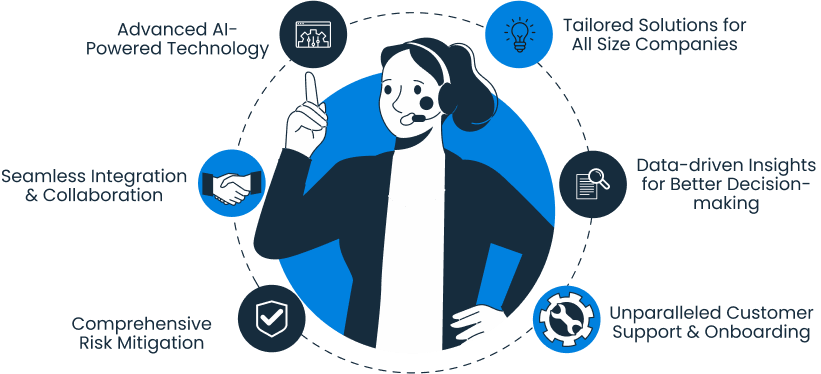In today’s fast-paced and highly competitive technology industry, staying ahead requires efficient and effective management of various business processes. One critical aspect that often demands significant attention is contract management. Handling many contracts, such as vendor agreements, customer contracts, and licensing agreements, can be a challenging task that requires careful organization and oversight.
Thankfully, technological advancements have given rise to contract management software designed specifically for the technology industry. This innovative solution offers a wide range of benefits aimed at streamlining operations, mitigating risks, enhancing compliance, and improving overall productivity.
Challenges Faced by the Technology Industry

The technology industry faces several challenges that can impact its operations and overall success. These challenges include:
Contract Delays:
- Manual processes cause unnecessary slowdowns: Relying on manual methods for managing contracts introduces significant delays. Each step, from drafting to approval, takes longer, creating bottlenecks that slow down the entire process.
- Longer contracting cycles delay revenue: Extended contracting cycles mean that deals take longer to finalize, postponing revenue recognition. This delay can affect the company’s cash flow and financial performance.
Growth Inefficiencies:
- Bigger companies face more contract-related issues: As technology companies grow, the volume and complexity of their contracts increase. Without an efficient system in place, managing these contracts becomes more challenging, leading to greater inefficiencies.
- Inefficiencies lead to lost revenue and wasted money: Inefficient contracting can lead to significant revenue loss, where potential earnings are missed due to delays and mistakes. Additionally, inefficient processes can lead to overspending on resources and missed cost-saving opportunities.
- Higher risk of compliance problems: As the number of contracts grows and they become more complex, there is a higher risk of not following legal and regulatory rules. This can result in expensive fines and harm the company’s reputation.
Disorganized Contracts:
- Contracts are spread across different departments and locations: In many tech companies, contracts are often stored in different formats and places, like various departments or both physical and digital storage. This makes it hard to find and handle contracts efficiently.
- Hard to manage and streamline operations: Disorganized contracts create challenges in maintaining a cohesive and streamlined operation. It becomes difficult to track contract statuses, meet deadlines, and ensure all parties are on the same page.
Need for a Centralized System:
- Brings all contracts into one place: A centralized contract lifecycle management software puts all contracts together in one easy-to-reach place. This ensures that everyone in the organization can access the contracts they need when they need them.
- Makes workflows smoother and improves visibility: Centralized systems make work easier by automatically handling tasks that repeat and showing clearly how each contract is doing. This reduces errors and speeds up the entire contracting process.
- Speeds up contract processes and ensures compliance: By automating and standardizing contract processes, a centralized system accelerates contract creation, review, and approval. It also helps ensure that all contracts comply with legal and regulatory standards, reducing the risk of non-compliance.
- Helps save money and boost growth and efficiency: A unified platform optimizes spending by identifying cost-saving opportunities and eliminating inefficiencies. This not only saves money but also supports growth by enabling the company to operate more efficiently and effectively.
Related Article: Best Contract Management Software: Top 10 CLM In 2024
The Types of Contracts Used in Technology

Service Level Agreements
In technology contracts, Service Level Agreements (SLAs) are important because they explain what services a customer will get from a provider. They include details like how often services should work without problems, how quickly the provider will respond to issues, and what happens if the provider doesn’t meet these promises.
SLAs also say who needs to do what, how performance will be checked and reported, and when either party can end the agreement if things don’t go as planned. They help make sure everyone knows what to expect and provide ways to solve problems if service levels aren’t met in technology deals.
Master Service Agreements
Master Service Agreements (MSAs) are foundational contracts in the technology industry, serving as overarching agreements that establish the terms and conditions between a service provider and a client. These agreements typically outline the scope of services to be provided, including details such as pricing, delivery timelines, intellectual property rights, confidentiality provisions, and dispute resolution mechanisms.
MSAs provide a framework for future transactions between the parties, streamlining the negotiation process for subsequent projects or services. They are designed to protect the interests of both parties while fostering a long-term and collaborative business relationship.
Related Article: What Is Service Level Agreement? Your Ultimate Guide
Benefits of Implementing Contract Management Software in the Tech Industry

Contract management software can help solve various problems in the technology industry by streamlining and automating processes. Here are a few examples:
- Contract tracking and organization: Technology companies often deal with numerous contracts, including with customers, suppliers, partners, and employees. Contract lifecycle management (CLM) software can centralize all contracts in one system, making it easy to track their status, renewal dates, and terms.
- Improved efficiency: Manual contract management processes involving paper-based documents or spreadsheets can be time-consuming and prone to errors. Contract management software automates tasks such as contract creation, review, approval workflows, and electronic signatures. This improves efficiency by reducing manual effort and ensuring faster turnaround times.
- Risk mitigation: Technology companies face various risks associated with contractual obligations. Contract management software provides features like alerts for key dates or obligations (e.g., compliance requirements), version control to track changes made during negotiations or amendments, and secure storage for important documents. These features ensure that contractual risks are minimized.
- Compliance management: The technology industry is subject to numerous regulations such as data privacy laws (e.g., GDPR). Contract management software enables companies to include specific clauses related to compliance requirements in their contracts easily. It also allows them to monitor compliance throughout the contract through automated reminders or notifications.
- Enhanced collaboration: Technology companies often work with cross-functional teams across different departments or even across locations globally. Contract management software enables real-time collaboration on contracts by providing a centralized platform accessible by multiple stakeholders simultaneously. It also provides a clear audit trail of discussions and approvals during the negotiation process.
- Cost savings: Inefficient contract processes can cause extra expenses, like missing renewal dates, leading to higher costs or penalties for not following contract rules. Contract management software helps save money by better tracking terms like pricing discounts or early termination options.
Related Article: Top 10 Contract Management Best Practices In 2024
Why Choose Volody’s CLM Software for Your Business?

Volody’s AI contract management software is tailored to help software companies accelerate growth by accelerating contracting cycles & eliminating bottlenecks. Volody AI CLM software’s user-friendly platform accelerates user adoption & streamlines operations.
Volody’s AI contract management software is designed to assist rapidly growing tech companies in simplifying their contract processes and boosting revenue growth. It helps streamline how contracts are handled, making it easier for these companies to manage their agreements and increase their earnings.
Our easy-to-use CLM software, along with our strong customer support, helps tech companies focus on growth. By using our smart contract management software, they can automate routine tasks, freeing up time and resources. This allows companies to concentrate on expanding their business instead of getting bogged down with repetitive contracting tasks. Accelerate approvals with automated workflows and standardize agreements to mitigate risk.
Features of Volody’s AI CLM Software:
Accelerate Approvals:
CLM solutions offer features that streamline the approval process for contracts within technology firms. This includes automated workflows that route contracts to the appropriate stakeholders for review and approval, reducing the time it takes to finalize agreements. By digitizing and automating approval processes, CLM systems help technology firms expedite contract cycles, improve efficiency, and minimize delays in project commencement or service delivery.
Obligation Management:
CLM platforms enable technology firms to effectively manage contractual obligations throughout the contract lifecycle. These solutions typically offer features such as alerts and notifications for key contract milestones, renewal dates, and compliance requirements. By centralizing obligation management within the CLM system, technology firms can ensure that they fulfill their commitments, mitigate risks of non-compliance, and maintain strong relationships with clients and partners.
Central Repository:
CLM solutions provide technology firms with a centralized repository to store, organize, and access all contract-related documents and data. This repository serves as a single source of truth for contracts, enabling stakeholders to quickly locate and retrieve relevant information as needed. By consolidating contract data in a centralized repository, CLM systems improve visibility, accessibility, and control over contract portfolios, facilitating better decision-making and risk management.
Risk and Compliance:
CLM solutions help tech companies handle risks and follow rules. They can check contracts to find possible problems and make sure everyone follows the rules. These tools also help keep up with laws and industry rules. By using CLM systems, tech firms can prevent legal and money problems, protect their reputation, and stick to the rules in their contracts.
FAQs:
Why is contract management software essential for technology firms?
Contract management software makes things easier by making processes faster, getting approvals quicker, and reducing problems like contracts taking too long or not growing well. It keeps all contracts in one place, does tasks automatically, and helps manage obligations better. This helps tech companies save time, spend less money, and follow the rules better.
How does contract management software contribute to addressing challenges faced by technology companies?
Contract management software helps tech companies with common problems like contracts taking too long, not growing efficiently, breaking rules, and having messy contracts. It does this by making things automatic, showing contracts in real time, and helping follow the rules. This software makes tech companies work better, be safer, and grow more steadily.
Conclusion
In the fast-paced and highly competitive landscape of the tech industry, efficient contract management is paramount for success. Manual processes often result in delays, inefficiencies, and compliance vulnerabilities, hindering the growth and profitability of technology firms. However, contract management software emerges as a powerful solution to overcome these challenges.
Contract management software made for the tech industry has lots of helpful features. It makes things easier by doing tasks like getting approvals, keeping all contracts in one place, and making sure everything follows the rules. This software helps tech companies do their contract work faster and with fewer mistakes.
Using this software, tech firms can do things like finish contracts faster, make fewer mistakes, and save time. This means they can spend more time on important stuff like making new things and planning for the future. Overall, this software is super important for tech companies to do their work well and grow.





